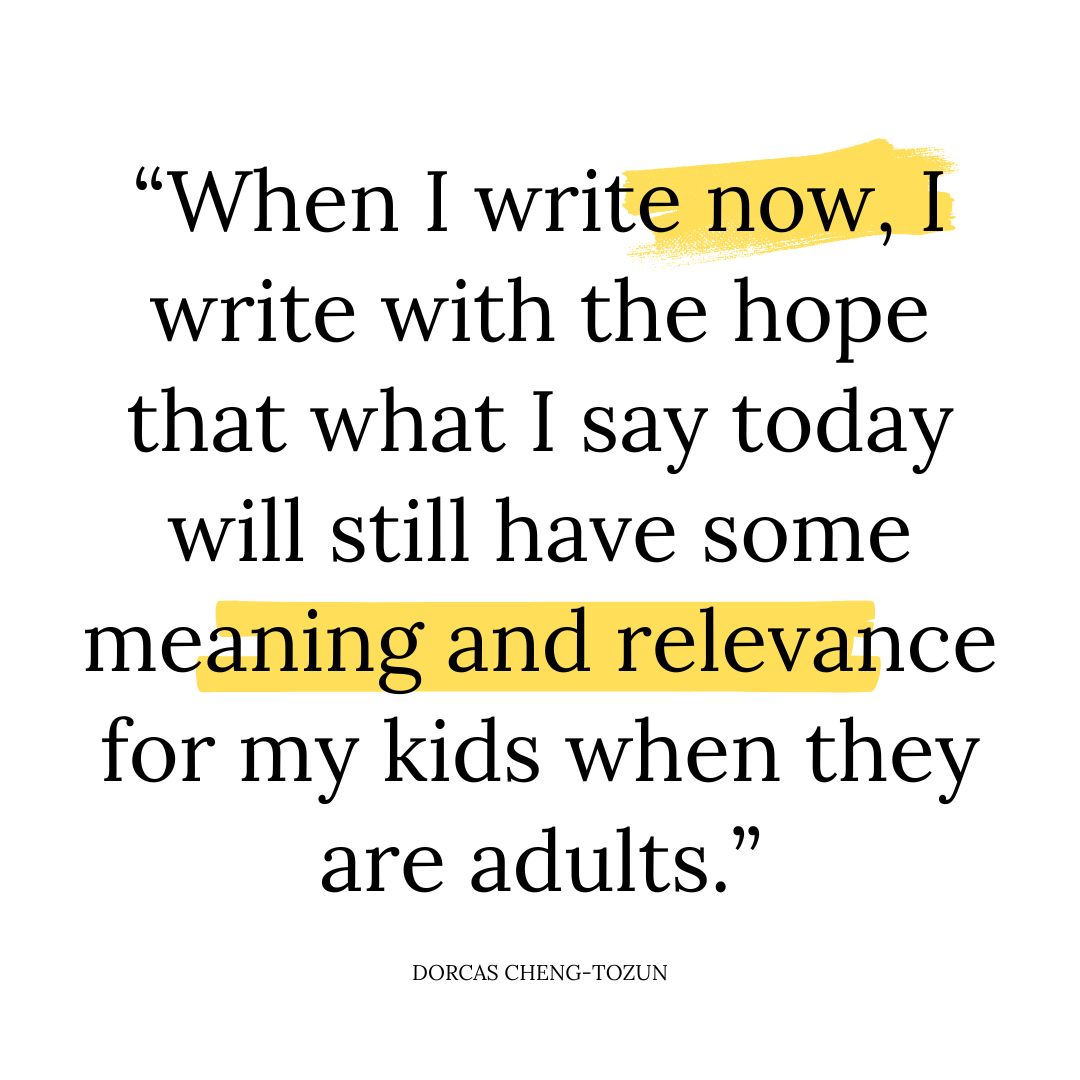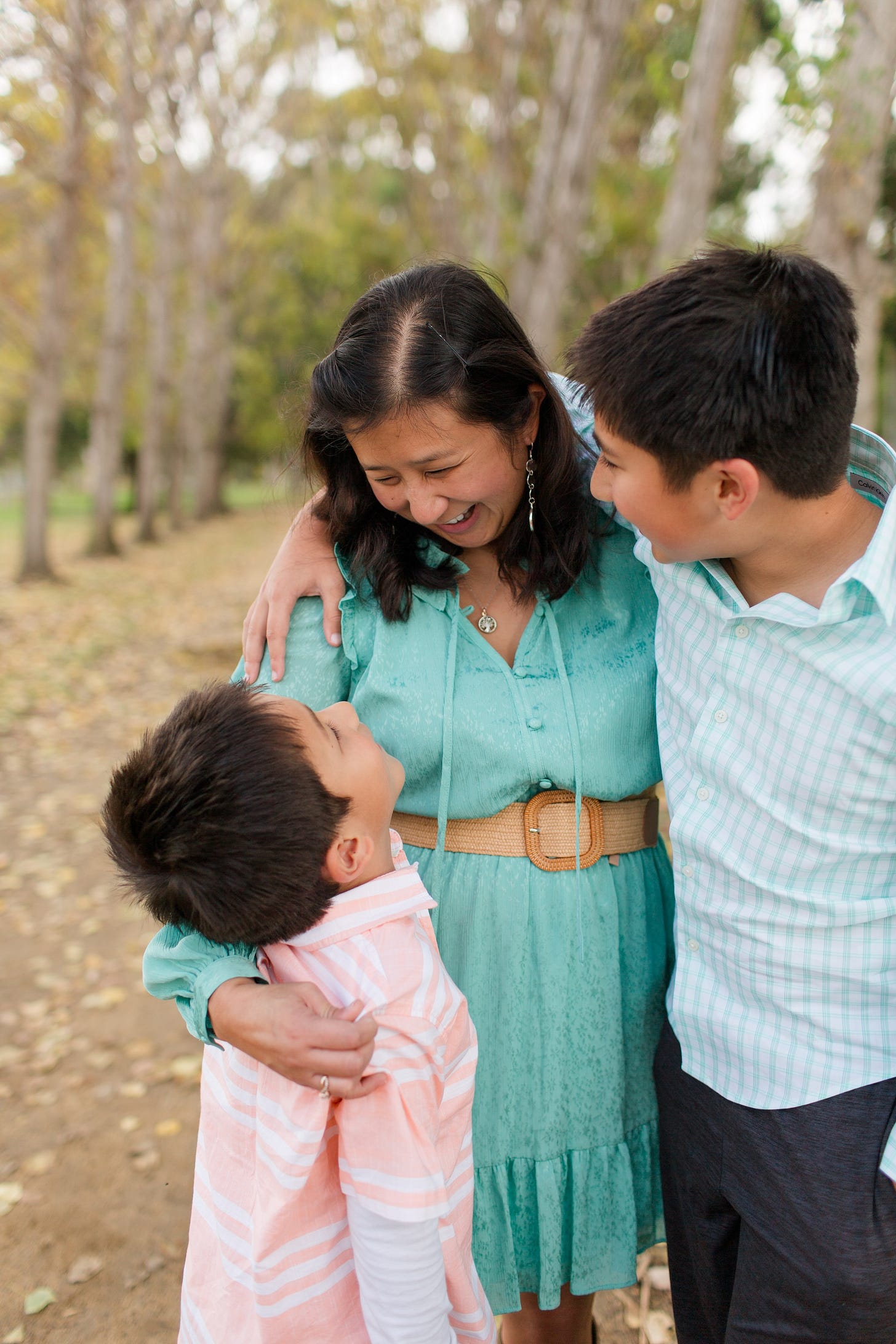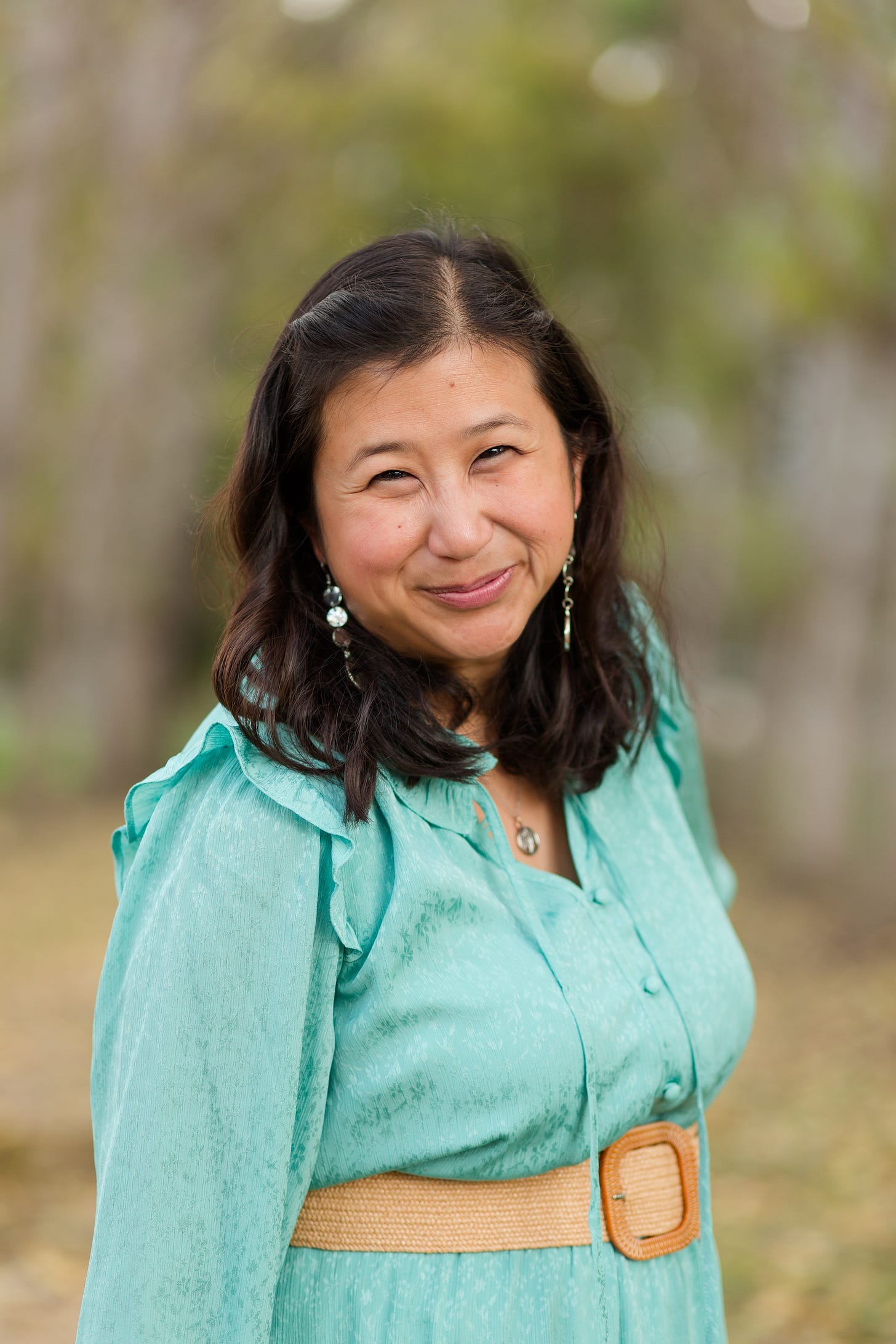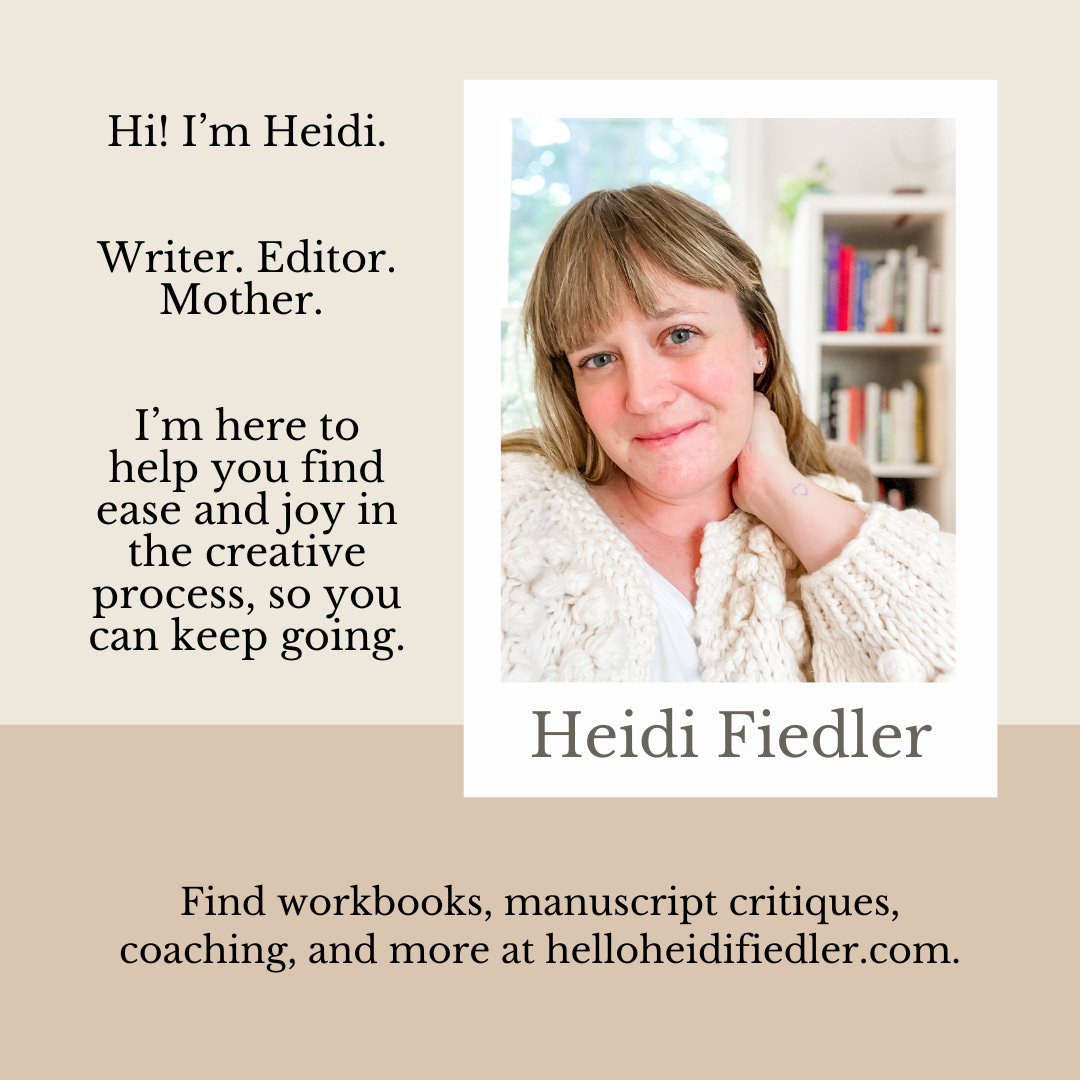How much time do you get to work on creative projects?
Nowadays, I don’t have a lot of time for strictly creative projects. This past fall, I started working part-time as a high school teacher for the very first time. I always knew that teachers worked really hard, but now that I am one, I have even greater respect for them! On top of my other part-time position with the nonprofit PAX, as well as book promotion and caring for my family, I’ve had almost no time for creative projects that are just for me.
That being said, I’ve also come to appreciate that our creativity can be expressed in almost everything we do. My teaching job has been so challenging in part because I’m building a new curriculum for a new class from almost nothing. Every single lesson plan I put together involves research and writing and organizing a coherent narrative, which is actually not that far off from the work I did when I was solely focused on writing. So, my need to be creative does continue to be met, but just in a very different context.
How did motherhood change your creative practice?
Becoming a mom changed everything in my life, as I’m guessing it does for pretty much all of us. On the one hand, I had to be a lot more flexible in when and how I created. I had little people to tend to, and their needs came first, even if I was in the middle of writing the most brilliant essay. On the other hand, I also had to be more disciplined. I couldn’t wait for inspiration to strike before I sat down to write. I had to be very cognizant of the available time I had in my schedule to work on my projects, and then make the most of that time even if I wasn’t feeling particularly inspired.
Parenting has also changed who I am as an artist and how I see my work. The longevity of my work somehow feels longer, and so I’ve moved away from the quick takes that used to be really popular among writers, especially during the heyday of blogs. When I write now, I write with the hope that what I say today will still have some meaning and relevance for my kids when they are adults. I write with the hope that they will appreciate who I tried to be and what I tried to teach them, as opposed to writing for clicks or solely to grow my platform.
How does art enrich your life? How does being a mother enrich your art?
My first career was in the nonprofit sector, where I worked really hard to try to bring resources, services, and opportunities to under-resourced communities. It was, and continues to be, incredibly meaningful work for me. But it was also terribly discouraging work that chewed up my soul a little more each time I stepped into the field. The problems we were trying to address seemed so insurmountable, and the suffering of people so significant that I had trouble maintaining hope that things could get better.
I started writing because I needed to heal from the despair and burnout I experienced in that work. In that regard, being an artist creates the space I need to process and recover so that I can continue to serve others. But writing also forces me to take a step back from what’s right in front of me to see the larger narrative. When I write, I can’t help but think about who has come before me and who will come after me. I think about all that has already been done, all the progress that has already been made, as well as what is left to do. I consider the ideas and solutions that are already available to us. One of my greatest hopes as a writer is to instill hope in my readers, and through that process, I find that I am a more hopeful person as well.
Being a mom keeps me humble. Every day, my two boys remind me of all that I don’t know. So, that pushes me to keep seeking, keep learning, keep trying to improve myself. I want to show my kids that the learning and growing process continues far into adulthood—and my writing is a significant way in which I process my own learning.
One of my greatest hopes for my children is that they will know their authentic selves and find joy in a calling that fits who they are and what they love to do. For that to be possible, I think they need to see it modeled by the adults in their lives. And so, that has also helped me to stay committed to pursuing some form of creativity in my life, because that is part of who I am and what gives me joy-filled purpose.
What do you do when you feel burnt out or filled with doubt?
Burnout and doubt have, unfortunately, been almost constant companions of mine since my early twenties. On multiple occasions, I have burned out so badly that I had to spend months in bed—doing nothing more than sleeping, crying, and occasionally eating—before I could function again. When I became a mom, I knew that getting myself to those extreme places of burnout was no longer an option. So, I have become more much adept at recognizing early signs of burnout in myself, such as rising anxiety, spiraling thoughts, and insomnia.
When those symptoms begin showing, then I know something has to change. I have to give something up. I have to cut back on my work hours. I have to take time away to play or rest, either with my family or sometimes on my own. In recent years, I’ve come to embrace a more contemplative approach to life and work. I see now that rest, solitude, and contemplation are not discretionary practices for me. They are the practices that keep me grounded enough and strong enough to continue on, as a professional and as a parent.
Since childhood, I have never been a person of confidence. It’s just not something that comes naturally to me. I am fortunate in that I married a man who has confidence in spades (that somehow manages not to turn into arrogance, thank God). My husband is my biggest cheerleader, and, since he’s an entrepreneur, he is completely unfazed by my artistic pursuits. In our almost nineteen years of marriage, one of the most valuable things he has taught me is that it’s okay to experiment and try and even fail. There is something to be gained in every experience we have.
I have also been grateful to be connected with many different writers over the years who have, over and over again, pulled me out of ditches of doubt that I have dug for myself. So often, doubt takes over when I am only talking to myself. When I bring others into the conversation, when I’m vulnerable enough to share my work with them, they are able to offer perspective, wisdom, and practical advice, which gives me the encouragement I need to keep trying. I may need to make adjustments or pivot to a different project, but knowing that they are believe in me and my abilities makes all the difference.
Dorcas Cheng-Tozun is a writer, an editor, and a nonprofit and social enterprise professional. She is the author of three books, the most recent being Social Justice for the Sensitive Soul: How to Change the World in Quiet Ways. Her work has been published in dozens of publications in the US, Asia, and Africa. She is also the editorial director of PAX and an instructor of Social Innovation at Valley Christian High School. A native of Silicon Valley, Dorcas has also lived in mainland China, Hong Kong, and Kenya. She currently resides in the San Francisco Bay Area with her husband and their two sons (ages 11 and 6). You can find her at www.chengtozun.com or on Instagram, Facebook, or Linked In.
If you enjoyed this post, please 💛 it so others can find it or share it with your favorite creative mothers.
PS—The fastest way to grow as a writer is to book a manuscript critique or a creative coaching session with an expert.
My clients get agents, sell books, and win awards. They also learn how to find ease and joy in the creative process, so they can keep going when life gets hard.












I really like these lines: In that regard, being an artist creates the space I need to process and recover so that I can continue to serve others. But writing also forces me to take a step back from what’s right in front of me to see the larger narrative. :)